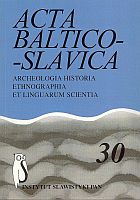Lada (Didis Lado) baltų ir slavų rašytiniuose šaltiniuose
Lada (Didis Lado) in Baltic and Slavic Written Sources
Author(s): Rimantas Balsys Subject(s): Cultural history
Published by: Instytut Slawistyki Polskiej Akademii Nauk
Keywords: Lada; Lithuanian mythology; theonyms of Balts and Slavs
Summary/Abstract: The article discusses the nature of written Baltic and Slavic sources which reference Lada and Ladona (and also other forms of this theonym) and attempts to answer the question of this deity’s authenticity in the pantheon of the Balts based on the work of earlier investigators and ethnographic, folklore, historical and linguistic material. The problem of Lada’s authenticity has intrigued/interested investigators of the ancient religion and mythology of the Balts from the first half of the 19th century until the present time, although they have evaluated the references to this deity in diverse ways. A portion of Lithuanian investigators of mythology have treated Lada (Ladonas) critically. Another group of investigators has harbored no doubts on the authenticity of Lada (Ladonas). The opinions of investigators from other countries has also diverged on the question of the reliability of the sources, and subsequently on the authenticity of the deity Lada (Ladonas). There are those who believe these deities the creation of Jan Dlugosz himself, taken from the refrains of songs. For this reason, most likely, Lada and Ladonas are not mentioned from the mid-20th century on in descriptions of the Slavic religion, reasoning that controversy still exists in regard to deities such as Lada. Belarusian investigator N. Nikolski considers Lado the Slavic god of weddings; Bulgarian investigator T. Koleva calls Lada the Slavs’ goddess of weddings and domestic harmony; J. Miroliubov states Lada is the ancient Slavic deity of concord, peace, domestic bliss, generosity and fertility, because it used to be said upon finding footprints in the dew of the field that “Generous Lada has passed through, the harvest will be abundant.” It has to be admitted that many investigators (and even in the second half of the 20th century and beginning of the 21st century) have confined themselves to superficial and uncritical retelling or free interpretation of sources from the 15th and 16th centuries, or to the writings of mythologists and ethnographers (usually romantics) from the mid-19th and beginning of the 20th centuries, without providing any clearer arguments witnessing to or negating the authenticity of Lada (Ladonas). Thus is one forced to begin at the beginning, i.e. to return to the written sources of the 16th and 17th centuries. Conclusions 1. The question of the authenticity of the deities (Lyada, Dzydzilelya) referenced in the written sources of the Slavs remains unsolved. 2. In liberal anthologies of Slavic written sources, Lada and Ladonas are ascribed to the Balts as well. In reality the Baltic sources only provide evidence that there were rituals during the performance of which sacred songs were sung with the refrains lado, laduto. 3. Uncritical usage of 16th century written sources and the works of mid-19th century ethnographers (romantics) has allowed investigators to interpret ledų dienos (“days of ice, hail”) rituals as the adoration of winter goddes
Journal: Acta Baltico Slavica
- Issue Year: 2006
- Issue No: 30
- Page Range: 597-609
- Page Count: 13
- Language: Lithuanian

